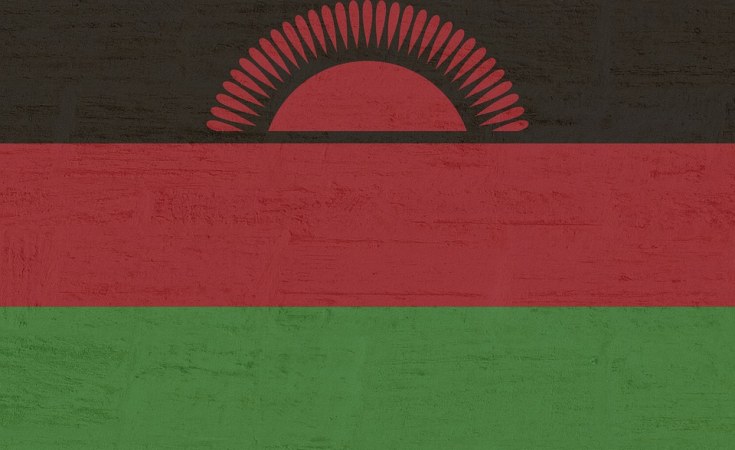
Pixabay
Malawi flag.
15 JULY 2021
Nyasa Times (Leeds)By Watipaso Mzungu
The International Trade Union Confederation (ITUC) and the International Trade Union Confederation (ITUC-Africa) have denounced the passing of the controversial Labour Relations (Amendment) Bill of 2021 and the Employment (Amendment) Bill of 2021 by the Malawi Parliament without consulting local Tripartite Labour Advisory Council (TLAC).
ITUC and ITUC-Africa, in a statement released on Wednesday, have strongly condemned the President Dr. Lazarus Chakwera-led administration for trying to limit the right to strike and to punish workers who exercise this right.
The statement further urges President Chakwera not to assent to the bill and to refer it back to the Tripartite Labour Advisory Council for meaningful and thorough consultation, taking into account the technical advice of the ILO.
The two institutions, in a joint statement released on Tuesday and co-signed by the organization's president Ayuba Wabba and his General Secretary Sharan Burrow, say the contentious bills raise serious concerns in relation to their compliance with the International Labour Organization (ILO) Convention on Freedom of Association and Protection of the Right to Organise, 1948 (No. 87), which Malawi ratified in November 1999.
Wabba and Burrow say the Bills are also said to be in conflict with the Right to Organise and Collective Bargaining Convention of 1949 (No. 98), as ratified by the Malawi Government in 1965 when Malawi became a member of the ILO.
"The Bills are arguing that the 'disingenuous intention' by the Chakwera government to limit the right to strike and to punish workers who exercise this right goes against the principles enshrined in these conventions.
"In addition, we have serious concerns with the provisions that grant an employer the right to withhold wages as well as the provision in the Labour Relations Amendment Bill that arrogates exclusive power to the Minister to determine essential services without due process and excludes the Tripartite Labour Advisory Council; we also have serious concerns about the amendments to the provisions of the Industrial Relations Court," reads the statement in part.
Wabba and Burrow further state that the passing of the Labour Relations (Amendment) Bill 2021 and the Employment (Amendment) Bill 2021 without consultations is an abrogation by Chakwera's government of its international obligation since Malawi is a party to the ILO Convention on Tripartite Consultations (International Labour Standards), 1976 (No. 144).
The obligation requires consultations to be undertaken between the tripartite partners.
ITUC and ITUC-Africa say they find it incomprehensible and unacceptable that a government that ascended to power through popular participatory resistance would engineer a paternalistic legislative process in such a brazen manner.
"In your inauguration speech on 6 July 2020, Mr President, you gave credit to the workers and employers for supporting your campaign... and you promised the Tonse philosophy of collective responsibility that when 'we have differences, we will still have to listen to each other and accommodate each other, for we have no other compatriots in all the world than each other'.
"Unfortunately, just one year into office, we already see this commitment fading, and we are worried by this development of not listening to the workers' concerns," say Wabba and Burrow in the epistle to Chakwera.
"We, therefore, urge your person and office to abide by Malawi's obligations under Conventions 87, 98 and 144 of the ILO; and we advise your government to seek the technical assistance of the ILO to ensure that the draft bills comply with international labour standards outlined in the conventions that Malawi voluntarily ratified.
"Mr President, we call on you not to assent to the bill and to refer it back to the Tripartite Labour Advisory Council for meaningful and thorough consultation, taking into account the technical advice of the ILO," they add.
There was no immediate comment from the Presidential Spokesperson Brian Banda on the matter.
Meanwhile, the Malawi Congress of Trade Unions (MCTU) has cancelled protests it organized to demonstrate its anger over the passing of the controversial Bills.
MCTU General Secretary Madalitso Njolomole told journalists in Lilongwe that the cancellation of the protest follows a successful discussion they had with Chakwera earlier in the day.
Read the original article on Nyasa Times.
Malawi anti-workers bill: Trade Union cancels demonstrations
Jul 14, 2021 Russell Kondowe

Malawi Congress of Trade Union (MCTU) has called off protests over the Labour Relations Amendment Bill following a meeting with President Lazarus Chakwera.
Secretary General for MCTU Madalitso Njolomole said they met President Chakwera, Deputy Labour Minister Vera Kamtukule and Homeland Minister Richard Chimwendo today.
Chakwera during the meeting assured the labour union that he will not assent to the Labour Relations Amendment Bill which was tabled in Parliament by the Government last week and was also passed by legislators.
According to Njolomole, Chakwera was shocked that consultations were not conducted before the bill was taken to Parliament. Chakwera then promised that he will wait for consultations before deciding whether to assent to the bill or reject it.
The cancelled demonstrations were expected to be held in all the four major cities of Lilongwe, Blantyre, Zomba and Mzuzu.
The Labour Relations Amendment Bill provides for an employer’s right to deduct wages from an employee who is on strike. It also clarifies the categories of essential services to which the right to strike and lockdown does not apply.
MCTU said last week that the bill infringes on the workers’ rights to stay away from work. The union also complained that it was not consulted.
However, deputy labour minister Kamtukule argued that workers will still have a right to hold strike but they would not be paid. She added that the union was consulted only that the consultation did not mean the union had to agree with the bill.
No comments:
Post a Comment